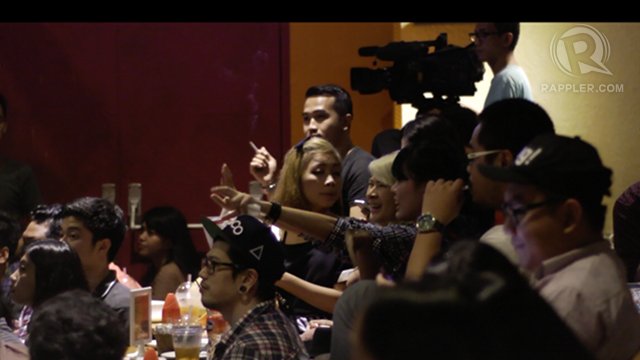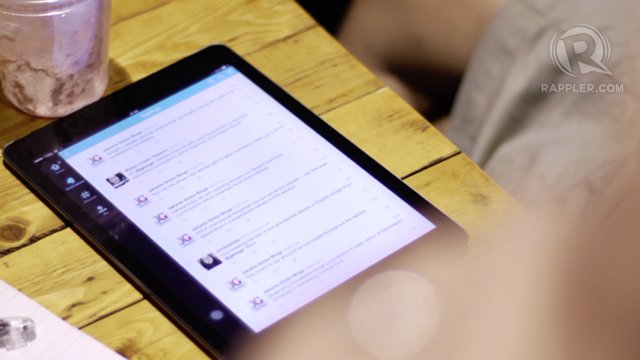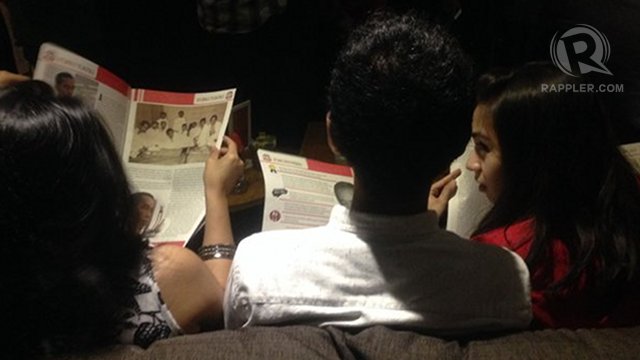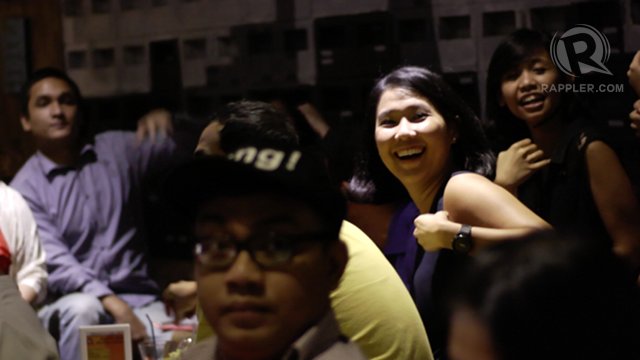SUMMARY
This is AI generated summarization, which may have errors. For context, always refer to the full article.

JAKARTA, Indonesia – Over cups of coffee and in between fast and furious livetweeting, yuppies at a café here erupt in cheers and boisterous laughter. On a Saturday night, everyone is glued to the screen but it’s not the World Cup they are watching.
Indonesia’s presidential election is what gets the youth raring with excitement. Like a much anticipated goal, the retorts and responses of candidates Jakarta Governor Joko “Jokowi” Widodo and former special forces commander Prabowo Subianto in the final presidential debate drew hoots and applause in one of the tightest election races Indonesia has seen.
Four days before the July 9 election, the youth movement Ayo Vote or “Let’s Vote” called out on social media for young Indonesians to join a nonton bareng or communal viewing to discuss the debate together, much like a World Cup viewing party in this football-crazy nation. It was standing room only.
“I think Indonesia is making progress with youth engagement. This is what happened tonight,” participant Johnson Pardomuan told Rappler on Saturday, July 5.
In the world’s third largest democracy, Indonesia’s Twitter-savvy youth is using events like this and social media to make its vote a game-changer.

Fighting apathy, disillusionment
Indonesia’s youth comprises a third of the 187 million registered voters, a powerful force that can swing the results in an election locked in dead heat. It is a potential that groups like Ayo Vote want to tap by raising awareness about politics and the elections.
Ayo Vote holds informal workshops and forums in schools and malls complete with musical performance and stand-up comedy to get the youth involved.
“The main problem is apathy because in the past, politics from the New Order regime is dirty and people think politics is dirty and far from them. But we try to show that politics is daily life. Everything is changed by politics like free education, free health for everyone,” Ayo Vote member Disna Harvens told Rappler.
The discussion moderator, Harvens said that corruption is one of the issues that turn the youth off. Endemic in Indonesia, corruption is a key issue after high-ranking officials ranging from ministers, ruling party leaders, to the chief justice of the Constitutional Court were arrested and sentenced for bribery.
“There’s too much corruption. Corruption is everywhere. We try to educate people that to prevent corruption, you must not set politics aside. Change your candidate. There are actually good people who have integrity,” he said.
On debate night, the people who showed up passionately rooted for their candidates. While the debate focused on environment, energy and food security, the young Indonesians who watched it said they are more concerned about jobs.
Southeast Asia’s largest economy goes to the polls as Indonesia faces slowing economic growth, inequality, and poor infrastructure development.
An entrepreneur, Pardomuan said his candidate won the debate. “It’s not just a campaign. Jokowi has the track record. That’s what he did as governor, starting from mayor of Solo and in Jakarta as governor. That’s what we saw. We study about him.”
IT strategist Ayu Yoningthea, 25, told Rappler that while she already decided on who she will vote for, the nonton bareng helped give her perspective.
“My vote is for Prabowo and it’s quite surprising for me to watch it because I really don’t know the environment, it’s on Jokowi’s side. This helps me open my mind, see how other people see Jokowi, whether that can influence me in my decision-making process,” she said.

Alternative to partisan reports
Social media is playing a pivotal role. With 65 million Indonesians on Facebook and Jakarta being named the world’s Twitter city, it is increasingly becoming an alternative source of information. The youth turn to the Internet in a country where TV networks are owned by political party leaders, and cover the campaign with obvious partisan bias.
“Social media is like independent media. We are free to give our opinion. We bring together our community because the freedom of speech in social media really matters in this election,” Pardomuan said.
While candidates are also going online to campaign and even spread black propaganda, Yoningthea said netizens like herself are also becoming sophisticated.
“It’s not just Facebook. We have Path, Twitter, absolutely everything, even Instagram. People express their thoughts and it brings the message to us. By having social media, we really like to minimize the number of those people who do not want to vote. It’s a good way to decrease that number,” she said.
Ayo Vote’s Harvens said that traditional media is not doing enough to reach out to the youth. It is here where social media and multimedia content fill the gap.
“We try to educate people by using the video, infographics to make it a lot easier because many people don’t want to read newspapers. How about we make it simple, a one-minute explainer to make it easier?”

‘Social media is like magic’
The youth cites the 2012 Jakarta gubernatorial election, where Jokowi harnessed social media in an Obama-like campaign that captured young voters’ imagination.
While TV is still the dominant form of media in Indonesia, Harvens said that social media will play an even bigger role with the rise of mobile technology.
“Many people from different islands use social media through the mobile phone. We know Internet penetration is going up by the use of smart phones, the cheap smart phones. Anyone can use smart phones,” he said.
Looking around in the café after the debate, Pardomuan said he is optimistic about the elections and Indonesia’s future.
“Now I see the young people in Indonesia participating more in politics, want to know more about politics, put their hearts and concerns in politics. Social media is just like magic for us. It’s a tool so we can really give our aspirations and be free.” – Rappler.com
Add a comment
How does this make you feel?
There are no comments yet. Add your comment to start the conversation.